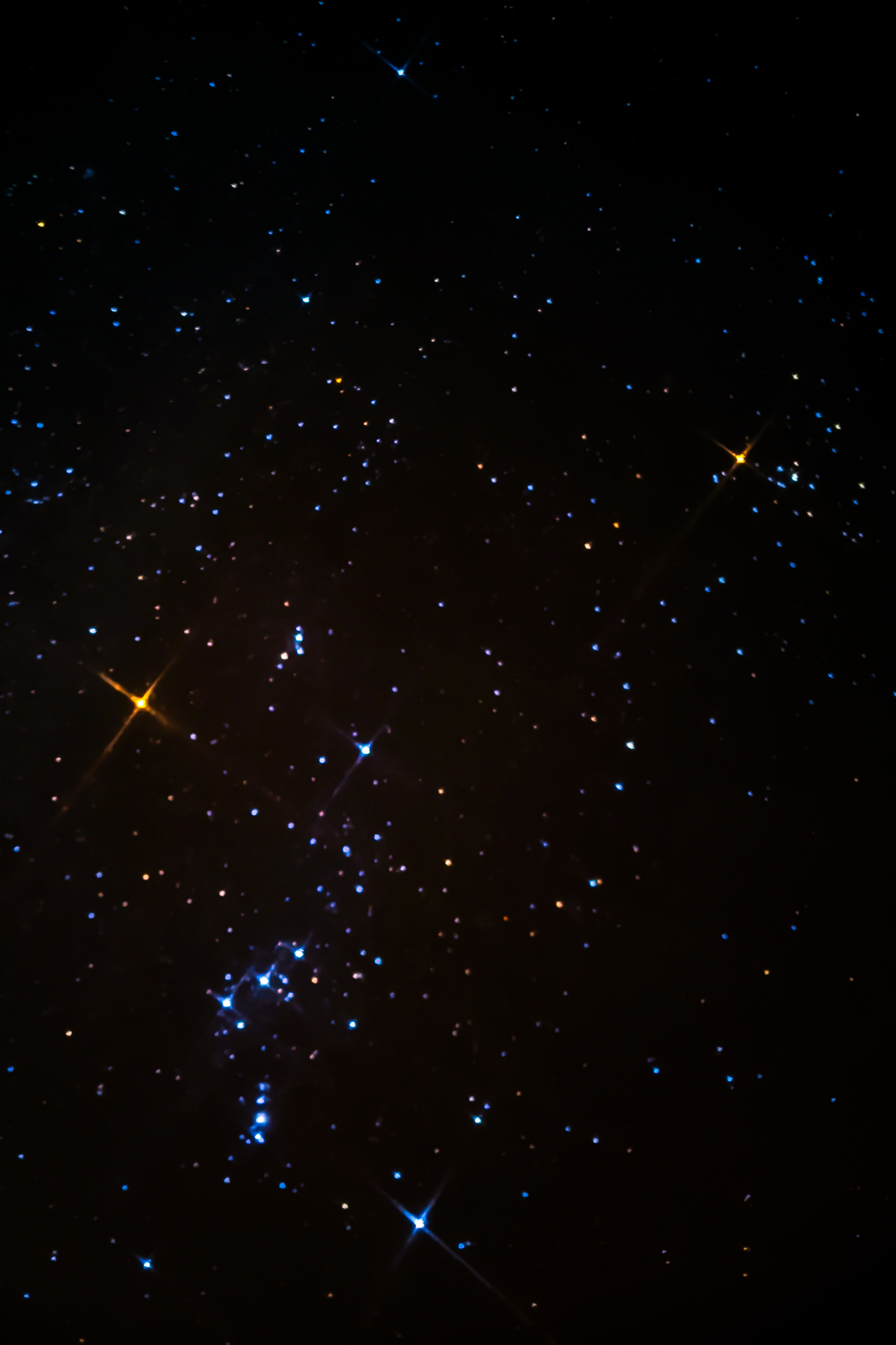Comments
darrellbear t1_iuduzht wrote
You also managed to catch the head of Taurus the Bull at upper right--the V shaped asterism is the Hyades star cluster, which forms the bull's head. The red star there is Aldebaran, the Eye of the Bull. If you extend the two legs of the V toward the upper left the two bright stars you see are the tips of the bull's horns. The planet Mars is presently hanging out between the tips of the horns; I don't see it in the image.
Betelgeuse is the bright reddish star at Orion's top left (his right shoulder as he's facing us).
asu1474 OP t1_iudvk9i wrote
Yeah, I know. Just used a short title to point to the area. I posted the annotations link in the comments if anyone's interested in the details.
asu1474 OP t1_iudxbre wrote
This Orion picture was taken last winter, so there's no Mars there.
Here's the one of the Taurus's area taken 4 days ago. You can see the Mars is the brightest object at the left/middle (image turned clockwise 90°, so left side is the horizon): https://www.reddit.com/r/space/comments/ygz50h/october_night_sky
wikigreenwood82 t1_iue1o63 wrote
Always disliked Orion's belt personally... what a waist of space
[deleted] t1_iucpbv6 wrote
[removed]
[deleted] t1_iucqauh wrote
[removed]
[deleted] t1_iucql6g wrote
[removed]
[deleted] t1_iucquc7 wrote
[removed]
[deleted] t1_iucrjyy wrote
[removed]
[deleted] t1_iudulmv wrote
[removed]
SnooDoubts826 t1_iuea3jy wrote
This is just what you see when big space pulls the wool over your eyes. Wake up sheeple!
/s, heh
sercommander t1_iueaqto wrote
You must be really far from city and light pollution. Best case scenario I see a Venus nad Moon.
Did you use some app for filtering out night pollution or it is just really good camera?
asu1474 OP t1_iuebp65 wrote
Bortle class 4 area. Clear moonless night. No pollution filters, just GCam/Night Sight running on the main mobile phone camera sensor (Sony IMX 682).
TechMe717 t1_iucwfgz wrote
Sorry but I don't believe a phones camera can do this. It can't do long exposures.
Dresden890 t1_iud39gb wrote
My stock camera app will do 30s long exposures, you need to upgrade from your Motorola Razr
[deleted] t1_iud3ckx wrote
[removed]
asu1474 OP t1_iucwyt9 wrote
You can search for the topic GCam/Night Sight on the net. There's a good article from Google somewhere.
Edited: here's a link to read https://ai.googleblog.com/2019/11/astrophotography-with-night-sight-on.html?m=1
GCam app from Google Pixel has been ported to a lot of different phone models.
lyvanna t1_iudl4uh wrote
Why wouldn't phone cameras be able to do long exposures? Some phones legit have astrophotography modes.
TheRooSmasher t1_iudnegy wrote
Time up upgrade.
I snapped these two on a walk last night with no special anything... just point and shoot.
They aren't cropped, edited, nothing.
https://i.imgur.com/efsdNRy.jpg https://i.imgur.com/yZ1OCT0.jpg
Not implying either are wonderful, just pointing out that phone cameras are incredible these days.
There were nearly no visible stars in the second one.
TechMe717 t1_iudnlyt wrote
I have the Galaxy S20. I never attempted night photography because I figured it's not even possible on this phone. I don't see any astrophotography or long exposure settings.
TheRooSmasher t1_iudnzzl wrote
I just used the stock Galaxy S22u camera. I think it automatically switches to night mode on the S22U. I can't remember for sure. I also took some with my pixel 7 pro, so I can't remember exactly what I did as far as turning on night mode on each one. The pixel 7 pro pictures sucked though.
Dresden890 t1_iudqbyj wrote
Swipe along to the "more" tab and there should be a "pro" option to manually adjust all camera settings. Don't say its not possible just cause you don't know how to use your phone.
YvngVudu t1_iudp8kr wrote
Bro it’s 2022… there are phones that can do long exposure shots…

asu1474 OP t1_iucqycs wrote
Camera: Mobile phone Xiaomi POCO X3 NFC/GCam 7.4 (Night Sight), diffraction star filter for mobile, tripod, Bluetooth triggered - 30 HDR+ frames x 16 sec max = 8 mins total shot time
Editing SW: Lightroom mobile
Annotations: https://nova.astrometry.net/annotated_full/7209871